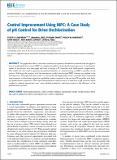Control Improvement Using MPC: A Case Study of pH Control for Brine Dechlorination
Author(s)
Sha'Aban, Yusuf A; Tahir, Furqan; Masding, Philip W.; Mack, John; Lennox, Barry
Download08306115.pdf (8.039Mb)
Terms of use
Metadata
Show full item recordAbstract
This paper describes a case study carried out to quantify the benefits achieved from the application of model predictive control (MPC) to regulate the pH in a brine dechlorination process. A mechanistic model of the process was developed and used to design a PI controller with feedforward compensation. The model was also used to quantify the potential benefits of commissioning an MPC controller on the process. Following the analysis with the mechanistic model, the designed MPC scheme was applied to the actual process. Through real-time results, it is shown that the deployment of this controller led to substantial improvements in disturbance rejection capabilities when compared to the existing PI controller with lead- lag feedforward compensator. The improved disturbance rejection led to a reduction in pH variation which resulted in reduced operational costs, more reliable production, and improvement in the efficiency of the dechlorination process.
Date issued
2018-03Department
Massachusetts Institute of Technology. Center for International StudiesJournal
IEEE Access
Publisher
Institute of Electrical and Electronics Engineers (IEEE)
Citation
Sha’aban, Yusuf A. et al. "Control Improvement Using MPC: A Case Study of pH Control for Brine Dechlorination." IEEE Access 6 (March 2018): 13418 - 13428 © 2018 IEEE
Version: Final published version
ISSN
2169-3536